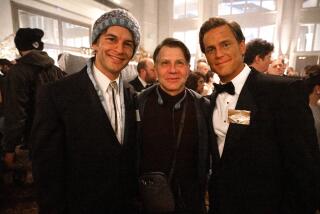The New World order, Pilgrim style
- Share via
GORE VIDAL wrote that America was founded by people who sought the freedom to practice more repressive forms of religion than were allowed in Europe. This is only partly true, I think. The Puritans who settled New England were almost uniformly zealous, intolerant and ill-prepared when they arrived, Nathaniel Philbrick argues in his new book, “Mayflower.” But survival in the New World required almost incomprehensible bravery, adaptability and a profoundly ambivalent moral expediency -- qualities that have defined and haunted our American identity ever since.
Philbrick is the bestselling author of “Sea of Glory” and “In the Heart of the Sea,” winner of the National Book Award for nonfiction in 2000. In “Mayflower,” he breathlessly retells the six decades from the ship’s landing at Plymouth Rock to the colonists’ battle with the native Wampanoag known as “King Philip’s War” as pivotal to all that followed in America.
The Mayflower left Plymouth, England, on Sept. 6, 1620. The Pilgrims aboard were outnumbered by employees of the Merchant Adventurers, which financed the expedition and whom they disdainfully called “Strangers.” Missing their destination at the mouth of the Hudson River, they dropped anchor near Cape Cod on Nov. 21.
Low on supplies and beset by scurvy, with winter looming and starvation lurking, the Pilgrims forged what became known as the Mayflower Compact with the businessmen, preventing a mutiny. “It is deeply ironic,” writes Philbrick, “that the document many consider to mark the beginning of what would one day be called the United States came from a people who had more in common with a cult than a democratic society.”
That first winter would test all of their cultish faith. “Ahead of them was an unknown wilderness that they could not help but inhabit with all their fears,” Philbrick writes, believing that “Satan and his minions were out there, conspiring against them.” Cold, starvation and disease killed 52 of the 102 Plymouth colonists before the spring thaw.
Only a “devil’s” bargain could save Plymouth and establish an English toehold in North America. Massasoit, leader of the Wampanoag, had seen his tribe decimated by typhus and smallpox that had been transmitted unwittingly by European fishermen. The surviving tribal members needed a strong ally against their warring, mostly intact Indian neighbors. Though weakened, Massasoit held two aces: the indomitable warrior Hobbamock, who befriended the Pilgrim soldier Miles Standish; and a wily interpreter named Squanto, who had been captured and sent to England, where he learned the language and persuaded the English to return with him.
Both Indian names, roughly translated, meant Devil. The Pilgrims, writes Philbrick, “had come to America to serve God as best they knew how, and they were now dependent on two Indians named Satan.”
The treaty Massasoit signed with Pilgrim governor William Bradford and diplomat Edward Winslow -- celebrated at the first Thanksgiving -- framed a workable peace for nearly six decades. “For a nation that has come to recognize that one of its greatest strengths is its diversity,” Philbrick writes, “the first fifty years of Plymouth Colony stand as a monument of what America might have been from the very beginning.”
Cultures merged. The natives who were spared from disease profited handsomely by selling furs and land to waves of colonists who founded the seaport of Boston, planted corn and pioneered dozens of settlements from New York to Maine. They shared clothes, weapons, names and even courts of law. But as wealth transformed piety in Plymouth Colony, the sons of Bradford and Winslow lacked their fathers’ vision.
Massasoit’s son Philip, a chief with European tastes, didn’t measure up either -- as warrior or statesman. Still, he felt compelled to unify the native tribes, who were becoming outnumbered and surrounded by the colonists, in a fight for survival.
Had the native Americans won King Philip’s War, they might have wiped New England off the map forever. It was fought with musket, sword and bow in swamps and forests with armies of hundreds -- although sometimes only dozens. Each side executed prisoners, burned villages and massacred women and children. The colonists prevailed only by dividing the tribes, making Mohawks and Mohegans their allies and remaining united themselves. It was, Rhode Island founder Roger Williams wrote, “our duty and engagement for one Englishman to stand to the death by each other in all parts of the world.”
The English victory, Philbrick argues, was a hollow one. “By doing their best to destroy the Native people who had welcomed and sustained their forefathers, New Englanders had destroyed their forefathers’ way of life.” By emptying the land of native Americans and selling prisoners into slavery, the Pilgrims’ descendants set the stage for two centuries of genocide.
Hindsight is 20/20, of course. But Philbrick triumphs in “Mayflower” because he combines it with empathy to challenge twin myths about America’s beginnings. The original Pilgrims were neither religious patriots nor bloody conquerors. And the native Americans they befriended, then betrayed were more sophisticated and less peaceful than commonly believed.
Jim Rossi lives in San Francisco, where he writes about science, history and the outdoors.
More to Read
Sign up for our Book Club newsletter
Get the latest news, events and more from the Los Angeles Times Book Club, and help us get L.A. reading and talking.
You may occasionally receive promotional content from the Los Angeles Times.








